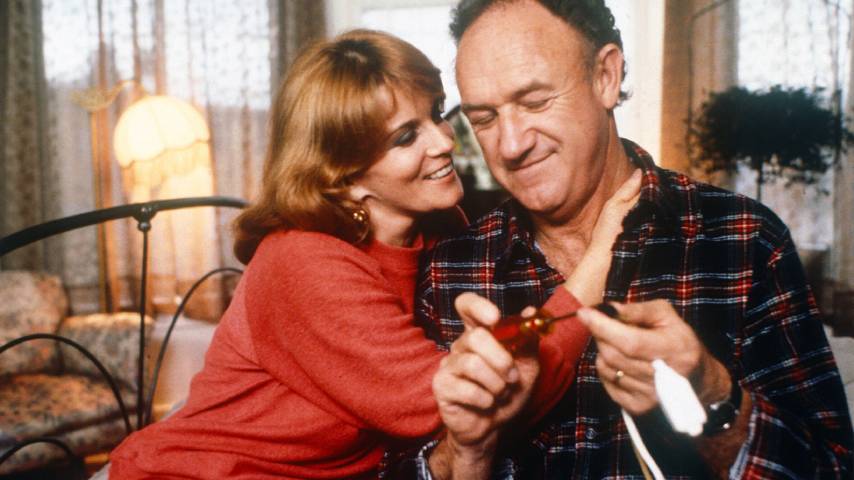Gene Hackman lends such an innate sense of gravity, intelligence, and authenticity to every role he plays that it’s hard to think of a film in which he’s been miscast or given a weak performance. The rule holds true in the recently released DVDs of Scarecrow, Night Moves, Twice In A Lifetime, and Target, films in which Hackman portrays, with equal skill, a big-talking ex-con drifter, a cerebral former football player turned private eye, a love-struck middle-aged blue-collar grunt, and an ex-spy who long ago embraced a life of domestic drudgery.
Hackman exploded onto the national consciousness in 1967’s Bonnie And Clyde, during an auspicious time when character actors with quirky sensibilities and a penchant for unconventional projects were temporarily in vogue. Like his peers Dustin Hoffman, Jack Nicholson, Al Pacino, Robert De Niro, Elliott Gould, Donald Sutherland, and George Segal, Hackman rode the ensuing American golden age of experimentation to stardom with unforgettable performances in a slew of classics, including 1975’s Night Moves, which memorably reunites Hackman with Bonnie And Clyde director Arthur Penn. Like the similarly themed The Long Goodbye, Night Moves reinvigorates and deepens the fading detective genre by plopping its complicated gumshoe down in a sun-soaked, sexually uninhibited Watergate-era morass of murder, cynicism, and moral ambiguity. A dogged P.I. in a world with little concern for law or order, Hackman is sent by a boozy failed actress to find her free-spirited runaway daughter, who is played with a beguiling mixture of fresh-faced innocence and nuclear sexuality by a young Melanie Griffith. A man in the throes of a profound mid-life crisis, Hackman finds Griffith without much trouble, but the film is ultimately more concerned with the perilous condition of Hackman’s soul and divided psyche than his success or failure at solving mysteries. Filled with shadows both literal and figurative, Night Moves elegantly combines the hard-edged pessimism, crackling banter, and all-consuming darkness of classic noir with the paranoia and bitterness that characterizes so much ’70s cinema.
Where Night Moves hearkens back to the conflicted heroes and complex femme fatales of ’40s noir, the old-fashioned character study Scarecrow feels like a throwback to the height of the Depression. Rambling affably from episode to episode, the film documents the picturesque misadventures of two glorified hoboes (Hackman and Pacino) as they amble across the country. Director Jerry Schatzberg favors long takes and panoramic shots that offer ample opportunity to soak in the nuances and subtleties of two great actors in top form. Pacino is a sustained delight in an uncharacteristically goofy, comic role, and his strong chemistry with Hackman favorably recalls the central dynamic in Midnight Cowboy. Scarecrow works beautifully as an extended actor’s duet, but the other major force at play is cinematographer Vilmos Zsigmond, who lends the film a radiant twilight beauty. Seldom do America’s open roads look as beautiful as when seen through Zsigmond’s lens. Scarecrow‘s affection for the struggling class extends to its supporting characters, including the mother of Pacino’s child, who takes center stage in a wrenching scene that casts Pacino’s abandonment of his family in a much harsher, more callous light. It’s a shame that Scarecrow ultimately resorts to big, flashy twists when it’s served so well by gentle examination and affectionate character-based comedy.
Twice In A Lifetime doesn’t boast the critical cachet of Scarecrow or Night Moves, but it should. An underrated 1985 drama rooted in a sympathetic, multi-dimensional portrayal of working-class life, the film casts Hackman as a husband, father, and grandfather whose humdrum existence is shaken up when he falls for sexy barmaid Ann-Margret. An unusually perceptive look at subjects seldom explored in American film—the emotional lives of working-class extended families and middle-aged sexuality—Twice In A Lifetime is especially poignant when documenting the collateral damage the central affair causes to Hackman’s wife (a touching Ellen Burstyn) and bitter adult daughter (Amy Madigan).
For Target, another 1985 release, Hackman again reunited with Arthur Penn to play a seemingly mild-mannered ex-spy forced to re-enter the cloak-and-dagger world alongside his sullen, unsuspecting son (Matt Dillon) when his wife is kidnapped. But this time, the magic is gone. Dillon comes off as a whiny, unlikable brat, the premise’s comic potential goes unrealized, and the spy stuff feels familiar and halfhearted. Good as he is, Hackman can’t transform the second-rate into a masterpiece.












![HBO teases new Euphoria, Larry David, and much more in 2026 sizzle reel [Updated]](https://img.pastemagazine.com/wp-content/avuploads/2025/12/12100344/MixCollage-12-Dec-2025-09-56-AM-9137.jpg)




























